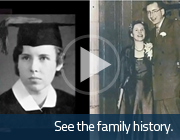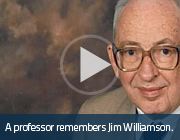Case Western Reserve University has announced $23.5 million in gifts from the Williamson family of Cleveland. The funds will support student scholarships, professorships and programs at the Mandel School of Applied Social Sciences, the College of Arts and Sciences, the School of Medicine (with emphasis on its Department of Nutrition), and the Case School of Engineering.
 "This extraordinary commitment will touch every corner of our campus, and benefit generations of students, faculty and, ultimately, society itself," said Barbara R. Snyder, president of Case Western Reserve. "We are honored and humbled by the gifts, and dedicated to ensuring they realize the family's vision for how education and research positively impact individuals and their communities."
"This extraordinary commitment will touch every corner of our campus, and benefit generations of students, faculty and, ultimately, society itself," said Barbara R. Snyder, president of Case Western Reserve. "We are honored and humbled by the gifts, and dedicated to ensuring they realize the family's vision for how education and research positively impact individuals and their communities."
In designating these gifts to Case Western Reserve, James Wood Williamson wanted to pay tribute to and recognize the distinguished legacy of the Williamson family in Cleveland. As the last local descendant of the family, James Williamson—who passed away in 2009—wished to celebrate the Williamson family's history of community service and ensure that future generations would continue to think big and find solutions, just as he and his family had over the years.
 "The problems of the future are not easy ones to solve," James Williamson once wrote. "It is young men and women who are supposed to 'dream dreams.' Problems get solved, I guess, by teaching students how to solve them."
"The problems of the future are not easy ones to solve," James Williamson once wrote. "It is young men and women who are supposed to 'dream dreams.' Problems get solved, I guess, by teaching students how to solve them."
The Williamson family founded many of the places and institutions that define Cleveland as a center of industry and philanthropy. Samuel Williamson, whose father had settled in Cleveland in 1812, had his homestead on what is now Public Square. Later, the homestead became the site of the family developed Williamson Building and, in turn, the BP America Building, now known as 200 Public Square. He was a law associate of Leonard Case Jr., who founded the Case School of Applied Science; additionally, Samuel Williamson helped found the Society for Savings (now Key Bank), which was designed to be a bank for the "ordinary man."
 Samuel's son, James DeLong Williamson, was an 1870 graduate of Western Reserve College and later served for a brief time as a teacher at the college. He also served twice as the college's acting president; and he was a long-time trustee. Among many significant community interests, the Reverend James DeLong Williamson was one of the founders of the Welfare Federation and the Community Chest, predecessors of the Center for Community Solutions and United Way; and he was the founding pastor of the Church of the Covenant.
Samuel's son, James DeLong Williamson, was an 1870 graduate of Western Reserve College and later served for a brief time as a teacher at the college. He also served twice as the college's acting president; and he was a long-time trustee. Among many significant community interests, the Reverend James DeLong Williamson was one of the founders of the Welfare Federation and the Community Chest, predecessors of the Center for Community Solutions and United Way; and he was the founding pastor of the Church of the Covenant.
Arthur P. Williamson, a son of James DeLong Williamson, was a major leader in Cleveland's business community. The company he headed developed and manufactured the valve stems critical to the successful development of air filled rubber tires.
This legacy of family accomplishment greatly influenced Arthur Williamson's only son, James W. Williamson, both in his own career and as the final steward of the family's estate. James Williamson was a brilliant student from a young age, but declined to follow his father in business. Instead, he chose engineering as his track in education and professional development.
After James's retirement as an industrial engineer with Ajax Tocco Magnethermic Corporation, he devoted the next twenty years to the world of computers and statistics as applied to social issues related to the alleviation of poverty. He developed a system and software designed to enable policy makers to input factual data from census tracts and other sources in order to reach reasonable predictions about likely human behavior, and thereby assist in achieving positive outcomes of programs for people and communities.
James Williamson's wife, Angela Bowen Williamson, a 1933 Flora Stone Mather graduate, was a constant support in these efforts. Angela was a dietician who received her advanced training in the Army serving in the South Pacific during World War II. After her discharge, Angela returned to Cleveland where she continued her practice as a nutritionist. She remained committed to her profession by promoting good nutrition throughout her life.
William D. Ginn, a retired senior partner at Thompson Hine LLP and a long-time family friend, characterized the Williamson gifts as "celebrating one's personal humanity through a deep regard for the common man. The Williamsons were pioneers when they arrived in Cleveland in 1812, and throughout successive generations, they never lost the belief that we are at one in how we regard each other."
Case Western Reserve University is among the nation's leading research institutions. Founded in 1826 and shaped by the unique merger of the Case Institute of Technology and Western Reserve University, Case Western Reserve is distinguished by its strengths in education, research, service, and experiential learning. Located in Cleveland, Case Western Reserve offers nationally recognized programs in the Arts and Sciences, Dental Medicine, Engineering, Law, Management, Medicine, Nursing, and Social Work.